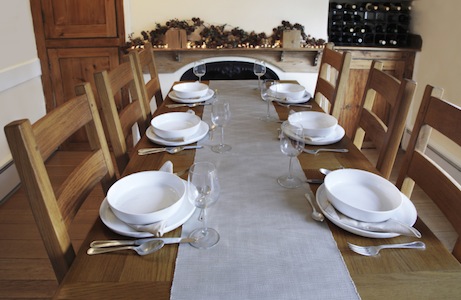From personal experience, Clarisse Thorn discusses the value of communal living, whether it’s because of economic uncertainty or to fulfill the basic human need to feel connected to a community.
It frustrates me that housing co-ops have a reputation for being a “student thing.” It’s true that many housing co-ops are student co-ops, but many aren’t. I spent years living in and visiting housing co-ops in various cities, and there are a lot of different co-ops out there. In these uncertain economic times, I keep hoping that co-ops will gain more stature as a living option, but so many people still hear about housing co-ops and say things like: “…what, a commune?…Like with hippies and drugs?” One of my married friends lives with her husband in a co-op, and hilariously, her mom keeps saying things like “Oh, honey, you’re not still making him live there?”…although he’s lived there longer than his wife, and loves it.
To be clear about my definitions: My primary experience is with housing co-ops in which each member has a single room, and the common space is split up in different ways depending on the group’s preferences. This can mean that the participants share cooking duties and split up chores, or it can mean that people deal with the situation in other ways. I’ve seen housing co-ops with as few as eight members, or as many as 100+. Some co-ops are full of artists; some are full of activists; some are full of whoever is interested enough to apply, from young professionals to the stereotypical hippies. People in their 20s, 30s, and 60s live in co-ops. Some married couples live in co-ops, and sometimes have kids there.
There are co-ops where each person has an entire separate flat, and the group doesn’t link up much. From all reports, these sound like they mix the worst of all possible worlds: the group has little to no interpersonal bonding, yet there’s enough common property that they can fight over it, or complain about noise coming from each other’s apartments. In contrast, the housing co-ops I’m familiar with tend to intentionally build community in a huge number of ways. Most communities buy food in bulk and cook together, perhaps by having each member cook for the group once every few weeks. Most also have official meetings at set times, where anyone can bring an issue to the house and have it resolved by the community. Some even have some kind of “social coordinator” who plans outings, parties, or other events for the community.
Of course, these are small communities, and they have all the issues one might imagine. Each housing co-op has its own culture, which can sometimes be very welcoming and sometimes very difficult for outsiders to engage. There’s always gossip and social maneuvering; it’s almost charming in a good culture, but completely toxic in a bad one. Single people hook up and/or fall in love; sometimes this results in beautiful marriages, and sometimes it results in endless drama.
After various wars in the nation’s history, it’s my understanding that co-ops often experienced a surge in popularity as soldiers came home and wanted to create communities together. And again, they seem like just the thing for uncertain economic times. That’s not merely true on a monetary level, but on a political one: Creating tight-knit communities is one way to deal with the slow destruction of social safety nets. Plus, there are tons of studies that show the health benefits of living with people and having a good community.
There’s also a gender angle: As we rework our definitions of marriage and family, co-ops are one concrete way to tackle the results. Last year, a popular article about singledom suggested briefly at the end that housing co-ops might be a solution. One of my feminist friends suggested that co-ops for single moms might be a godsend, if properly organized. The key, of course, is the organization. Starting a new co-op is not a small task.
If you’re interested in starting a housing co-op, joining one, or learning more about them, then the website for the nonprofit North American Students of Cooperation is a good place to start. They hold a yearly educational institute every November, which is a great opportunity to get a lot of information in one weekend. Also, one of the former executive directors wrote a great paper about why co-ops go under, which outlines case studies of co-op failure and offers best practices at the end. It’s a really good paper, but as far as I know it’s just been passed around hand-to-hand for years, so I put it up for download on my website.
Clarisse Thorn is Role/Reboot’s Sex + Relationships Editor.
Related Links:

